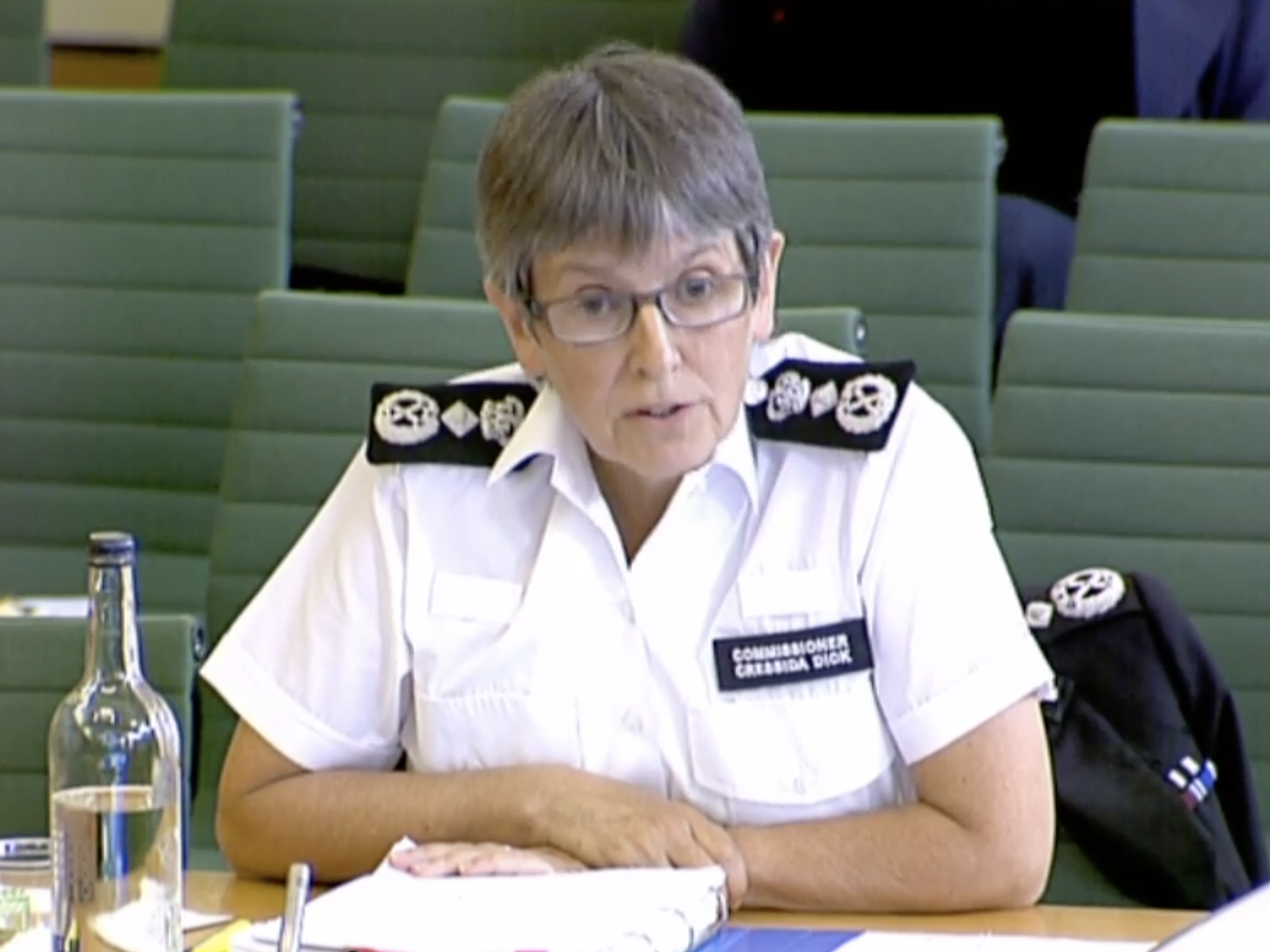Metropolitan Police chief denies force is ‘institutionally racist’ and pledges to listen to Black Lives Matter protesters
‘In the last few weeks people have had their consciousness raised ... and I am listening to that,’ says Dame Cressida Dick
Your support helps us to tell the story
From reproductive rights to climate change to Big Tech, The Independent is on the ground when the story is developing. Whether it's investigating the financials of Elon Musk's pro-Trump PAC or producing our latest documentary, 'The A Word', which shines a light on the American women fighting for reproductive rights, we know how important it is to parse out the facts from the messaging.
At such a critical moment in US history, we need reporters on the ground. Your donation allows us to keep sending journalists to speak to both sides of the story.
The Independent is trusted by Americans across the entire political spectrum. And unlike many other quality news outlets, we choose not to lock Americans out of our reporting and analysis with paywalls. We believe quality journalism should be available to everyone, paid for by those who can afford it.
Your support makes all the difference.Metropolitan Police commissioner Dame Cressida Dick has denied the force is institutionally racist after her officers were accused of racial profiling in a controversial stop-and-search incident involving Team GB sprinter Bianca Williams.
Dame Cressida said she was listening to Black Lives Matter protesters’ concerns about policing, and revealed she recently set up a new “oversight group” to examine the use of force by officers in London.
The Scotland Yard chief also apologised to Ms Williams after her officers dragged her from her vehicle and handcuffed her before finding nothing untoward inside the car.
Asked if the force was “institutionally racist” at the Commons Home Affairs Committee, Dame Cressida told MPs it was “not a label I find helpful”.
She added: “I don’t think we’re collectively failing. I don’t think [racism] is a massive systemic problem, I don’t think it’s institutionalised, and more to the point I think we have come such a very, very, very long way.”
Referring to recent Black Lives Matter protests, the Met commissioner said: “Clearly in the last few weeks people have had their whole consciousness raised about a huge variety of issues in relation to our black communities, and I am listening to that.”
Referring to reforms introduced following the Stephen Lawrence Inquiry two decades ago, she added. “I’m listening to my own staff, I’m listening to the public and I am prepared to see this as a time where we take another big step forward in the way that we did, I believe, 20 years ago.”
Neville Lawrence, Stephen Lawrence’s father, said last month he believed British police remained “institutionally racist”, despite the 1999 inquiry into failures in the Met’s investigation into his son’s murder six years prior. It was Sir William Macpherson – the retired judge who led the inquiry – who first labelled the Metropolitan Police “institutionally racist”.

Asked about Met officers’ treatment of Ms Williams on 4 July, Dame Cressida said reviews of the evidence by two separate teams found there no apparent misconduct. However, she said a referral had been made to the Independent Office for Police Conduct because of “the level of public concern”.
The commissioner said she has asked a senior officer to review the Met’s handcuffing practices to make sure it hasn’t become a “default”, and has set up an “oversight group” looking at the wider use of force.
Conservative MP Ruth Edwards asked the Met chief why the use of stop and search had risen from just over 19,000 searches in December to more than 43,000 searches carried out in May, during the height of lockdown.
Dame Cressida said: “Officers have had more patrolling time … and when they have come across people, when they feel they have grounds, they have been doing stop and search.”
Describing recent weeks as “turbulent”, she said she believed her officers had handled both Black Lives Matter protests and far-right demonstrations “as well as anybody could”.
“We have seen a level of tension, there’s no doubt about that ... People have been getting frustrated about, for example, at the way Covid has affected their community. People have looked at videos of police interactions with the public and got angry about that,” she said.
Asked about London School of Economics professor Tim Newburn’s recent warning of the potential for “widespread disorder” this summer, Dame Cressida said: “I’m not a sociologist, I don’t know how people will respond [to continued lockdown restrictions].
“I do know … I have people who are utterly determined to stay focused on their mission and we will be quick to deal with any potential disorder – we will be fast onto that.”

Join our commenting forum
Join thought-provoking conversations, follow other Independent readers and see their replies
Comments